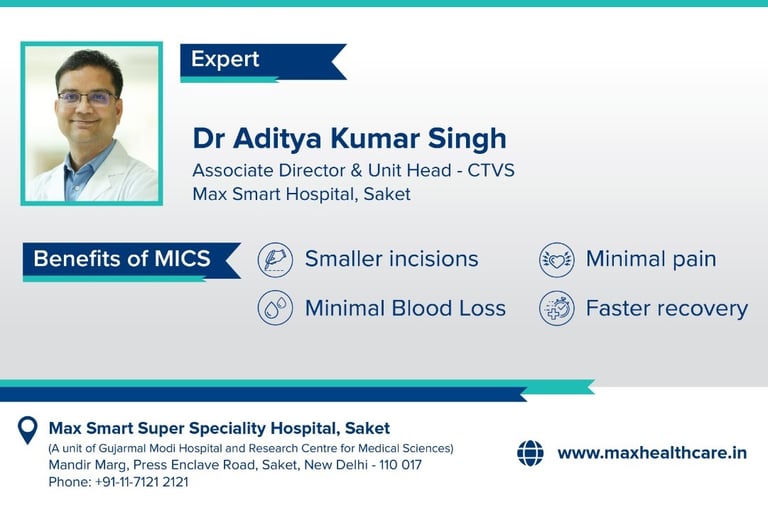WHAT IS MINIMAL INVASIVE HEART SURGERY?
Minimal Invasive Heart Surgery or Minimal invasive cardiac surgery (MICS) is a surgical approach that aims to minimize the trauma to the patient during cardiac procedures. It involves performing cardiac surgeries through small incisions, often using specialized instruments and techniques. MICS can encompass various procedures, including coronary artery bypass grafting (CABG), valve repair or replacement, atrial septal defect closure, and others.


BENEFITS OF MINIMAL INVASIVE HEART SURGERY
Minimal invasive cardiac surgery (MICS) presents numerous advantages over traditional open-heart procedures. With smaller incisions, MICS minimizes trauma to surrounding tissues, reducing postoperative pain and discomfort. Patients typically experience shorter hospital stays and faster recovery times, enabling a quicker return to normal activities. Moreover, the smaller incisions result in less scarring, enhancing cosmetic outcomes and patient satisfaction. By utilizing advanced imaging technologies and specialized instruments, MICS offers enhanced precision during surgery. Additionally, the reduced risk of complications such as infections and bleeding further underscores the benefits of this approach. Overall, MICS represents a significant advancement in cardiac surgery, prioritizing patient comfort, and recovery.
PROCEDURE(S) UNDER MINIMAL INVASIVE HEART SURGERY
Minimal invasive cardiac surgery (MICS) offers less traumatic alternatives to traditional open-heart procedures. Common MICS procedures include coronary artery bypass grafting (CABG), valve repair or replacement, atrial septal defect (ASD) closure, tricuspid valve repair, and left atrial appendage closure (LAAC). With small incisions and specialized instruments, MICS minimizes postoperative pain, shortens recovery time, and improves cosmetic outcomes. These advanced techniques enhance patient comfort and safety, making MICS a preferred option for many cardiac surgeries.
ROBOT ASSISTED MINIMAL INVASIVE HEART SURGERY
Robot-assisted minimal invasive heart surgery (RAMIHS) combines minimally invasive techniques with robotic technology to perform intricate cardiac procedures. Utilizing robotic arms controlled by a surgeon, RAMIHS allows for precise movements through small incisions in the chest. Common procedures include coronary artery bypass grafting (CABG), mitral valve repair or replacement, atrial septal defect (ASD) closure, and others. By enhancing precision and control, RAMIHS offers reduced trauma, shorter recovery times, and improved patient outcomes compared to traditional open-heart surgery. This innovative approach represents a significant advancement in cardiac surgery, providing patients with a safer and more effective treatment option.
RECEOVER AFTER MINIMAL INVASIVE HEART SURGERY
Recovery from minimal invasive heart surgery (MICS) is notably swift, with patients often experiencing shorter hospital stays and faster return to daily activities compared to traditional open-heart procedures. Post-surgery, patients receive meticulous monitoring, emphasizing pain management and early mobilization to mitigate potential complications. Discharge typically occurs within days to a week, followed by a gradual resumption of normal activities over several weeks to months. Adherence to postoperative instructions, including medication and follow-up appointments, is crucial for optimal recovery. Cardiac rehabilitation programs may be recommended to enhance cardiovascular health and facilitate long-term recovery, ensuring sustained well-being for the patient.
COST OF MINIMAL INVASIVE HEART SURGERY
The cost of minimal invasive heart surgery (MICS) in India varies based on factors like the procedure type, hospital, and surgeon's expertise. On average, MICS procedures range from ₹2,00,000 to ₹6,00,000 or more. This estimate typically covers surgical expenses but excludes additional costs like pre-operative tests, hospital stay, medications, and follow-up care. Some hospitals offer comprehensive package deals, bundling all services for a fixed price. Patients should discuss pricing details directly with healthcare providers to understand the total expenses involved. Additionally, exploring health insurance coverage or financial aid options can help manage the cost of MICS in India.

